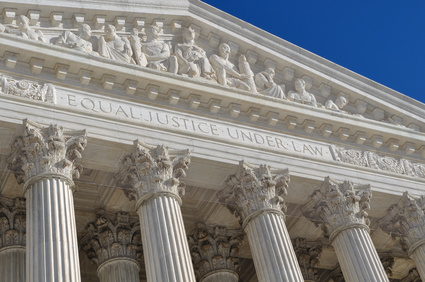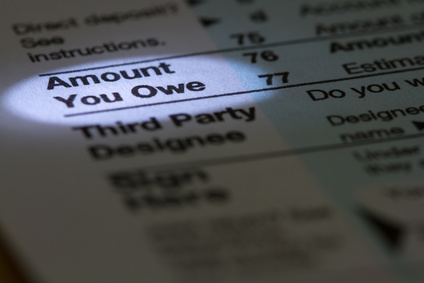The U.S. Court of Appeals for the Eleventh Circuit recently held that a collection letter sent to the consumer’s attorney is a “communication with a consumer” within the meaning of §1692g of the federal Fair Debt Collection Practices Act (FDCPA). Additionally, the Court held omitting a statement that disputes must be “in writing” in a disclosure under 15 U.S.C. §1692g does not amount to waiver of that requirement by the debt collector, and is instead an omission of a material term in violation of the FDCPA. A copy of the opinion in Connie Bishop v. Ross Earle & Bonan, P.A., et…
Posts published in “FDCPA”
Fair Debt Collection Practices Act
In a much-anticipated follow-up to its 2014 decision in Crawford v. LVNV Funding, LLC, 738 F.3d 1254 (11th Cir. 2014), the U.S. Court of Appeals for the Eleventh Circuit recently held that there is no irreconcilable conflict between the federal Fair Debt Collection Practices Act (FDCPA) and the Bankruptcy Code. In so ruling, the Court reversed the dismissal of two FDCPA cases filed against debt buyers that submitted proofs of claim on debts that were subject to a statute of limitations defense. A copy of the opinion in Johnson v. Midland Funding LLC and Brock v. Resurgent Capital Services, L.P. is available…
Yesterday’s decision from the U.S. Supreme Court in Spokeo v. Robins should bolster the defense of companies subject to several federal consumer protection statutes. The ruling addresses lawsuits that claim an injury created solely by the violation of a federal statute and require the plaintiff to demonstrate not only that the statute was violated, but that the plaintiff herself suffered harm. The opinion does not go as far as many in the consumer financial services industry would have liked (not all injuries must be “tangible”), but it does close the door on civil lawsuits many have faced. The opinion was…
In a unanimous decision yesterday, the U.S. Supreme Court held that attorneys retained as independent contractors by the Ohio Attorney General to collect debts owed to the state do not violate the federal Fair Debt Collection Practices Act (FDCPA) when sending collection letters on Attorney General letterhead. In so ruling, the Court noted that the FDCPA “bars debt collectors from deceiving or misleading consumers; it does not protect consumers from fearing the actual consequences of their debts.” Authored by Justice Ginsburg, a copy of the opinion in Sheriff v. Gillie is available here: Link to Opinion. Under Ohio law, debts owed…
In a federal Fair Debt Collection Practices Act (FDCPA) lawsuit, the U.S. Court of Appeals for the Eighth Circuit recently held that the Rooker-Feldman doctrine does not apply where the complained of conduct was not the underlying judgment but rather events that occurred during the state court litigation. A copy of the opinion in Hageman v. Barton is available at: Link to Opinion. The original creditor assigned a debt to a collection agency which in turn hired an attorney to collect the debt from the debtor. The attorney sent a letter, made a phone call and ultimately filed suit in the…
The U.S. Court of Appeals for the Fourth Circuit recently held that the fact that a debt is in default at the time it is purchased by a third party does not necessarily make that third party a “debt collector” subject to the federal Fair Debt Collection Practices Act (FDCPA). Instead, the Court held that the respective definitions of “creditor” and “debt collector” under the FDCPA, 15 U.S.C. § 1692 et seq., control whether an entity is a debt collector subject to the FDCPA. A copy of the opinion in Ricky Henson v. Santander Consumer USA, Inc. is available at: Link…
The U.S. Court of Appeals for the Second Circuit recently vacated the dismissal of federal Fair Debt Collection Practices Act (FDCPA) allegations that a debt collector’s notice stating the “current balance” of the debt without disclosing that the balance may increase over time due to interest and fees was “misleading” within the meaning of Section 1692e. A copy of the opinion in Avila v. Riexinger & Associates, LLC is available at: Link to Opinion. The defendant debt collector sent collection notices to the plaintiff debtors notifying them that their accounts were placed for collection. The notices stated the “current balance,” but…
The U.S. District Court for the District of Colorado recently denied a debt collector’s motions to dismiss FDCPA allegations that the debt collector’s statements made to the borrower’s attorney during settlement negotiations and statements made to the state court in court filings constitute a violation of the FDCPA, ruling that “none of the provisions implicated in [the borrower’s] claim should be dismissed on the basis that the alleged abusive conduct was communicated to third parties other than the consumer.” A copy of the opinion in Chung v. Lamb is available at: Link to Opinion. The debt collector’s employee contacted the…
The U.S. Court of Appeals for the Third Circuit rejected allegations that two repossession companies violated the federal Fair Debt Collection Practices Act, holding that the companies had a right to repossess a vehicle as collateral for an unpaid loan. A copy of the opinion in Heiko Goldenstein v. Repossessors Inc. is available at: Link to Opinion. In April 2012, the borrower, a resident of Pennsylvania, obtained an online loan in the amount of $1,000 from a consumer lending company. The borrower pledged his car as collateral for the loan. Because the consumer lending company was wholly owned by a Native American tribe and…
The U.S. Court of Appeals for the Eleventh Circuit recently affirmed a district court’s order requiring borrower’s counsel to pay a servicer’s attorney’s fees under Federal Rule of Civil Procedure 11, but reversed that part of the order that imposed sanctions jointly against both borrower and her attorney under the fee-shifting provision of the federal Fair Debt Collection Practices Act, holding only the attorney was liable. A copy of the opinion in Jocelyn Y. Diaz v. The First Marblehead Corporation, et al is available at: Link to Opinion. A student loan borrower in default sued her loan servicer, alleging that the…
The U.S. District Court for the Southern District of Alabama recently granted summary judgment in favor of a mortgage loan servicer and the trustee of a mortgage backed securities trust in a putative class action alleging violations of the federal Fair Debt Collection Practices Act (FDCPA), ruling that the “bona fide error” defense applied to the servicer and that the trustee was not a “debt collector” under the FDCPA. A copy of the opinion in Arnold v. Bayview Loan Servicing, LLC is available at: Link to Opinion. A borrower defaulted on his mortgage loan and filed a petition under Chapter 7 of…
The U.S. Court of Appeals for the Eleventh Circuit recently upheld the district court’s dismissal of a borrower’s amended complaint against a loan servicer alleging claims under the Fair Debt Collection Practices Act (FDCPA) and the Florida Consumer Collection Practices Act (FCCPA) for leaving a letter in the borrower’s mailbox, posting a letter to his front door, and sending a letter via registered mail offering the borrower various sums of financial assistance if he vacated the property. The Court held that the servicer’s actions did not constitute a demand for payment under the FDCPA and FCCPA and upheld the district…










